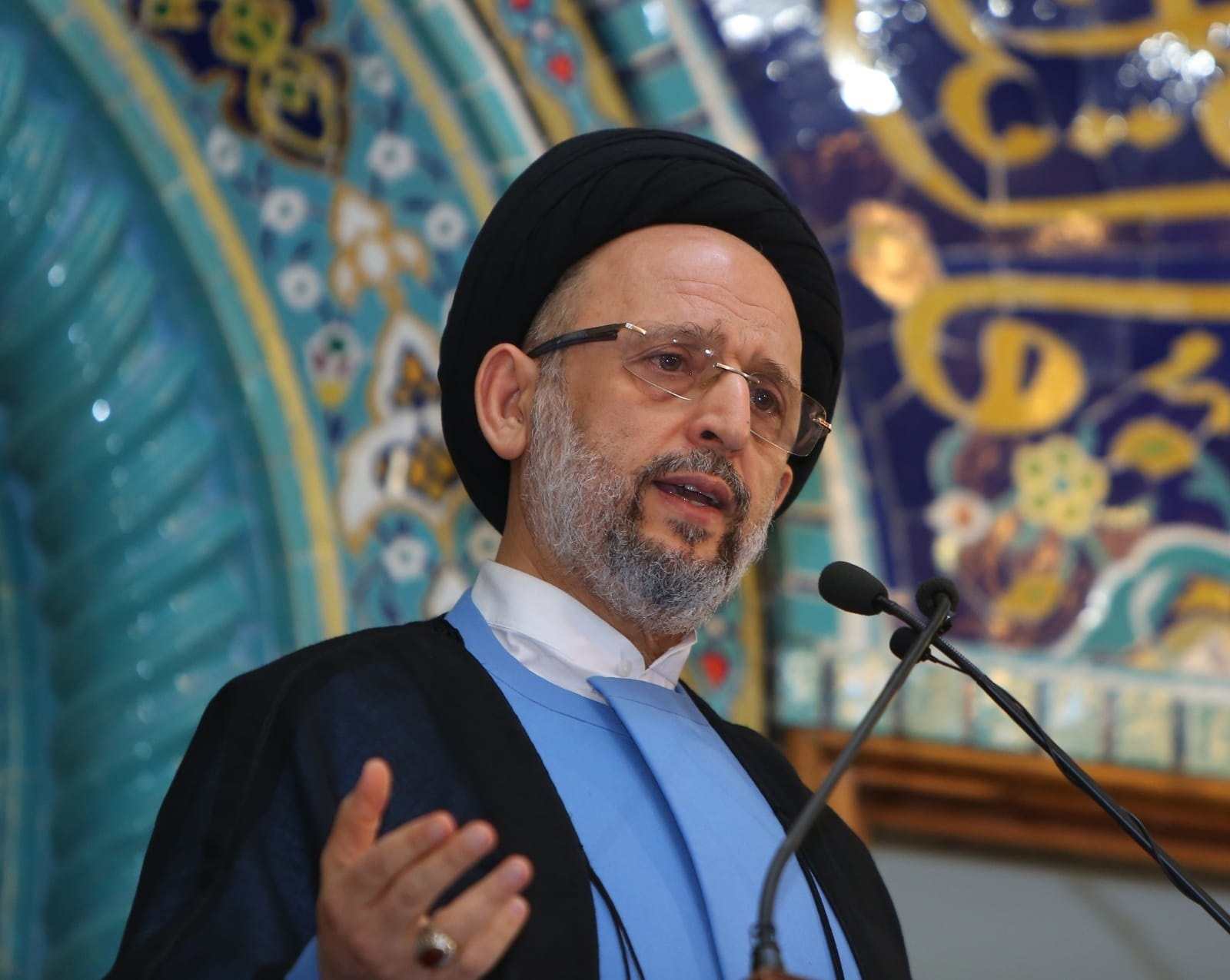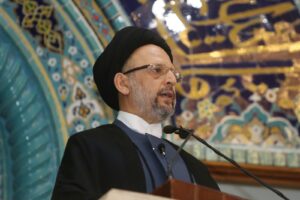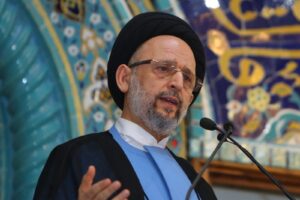Lessons from the life of Imam al-‘Askari (a.s.)
In the name of Allah, the Compassionate, the Merciful
His Eminence, Sayyed Ali Fadlallah, delivered the two Friday prayer sermons at the Imamain Al-Hassanain Mosque; Rabi al-Thani 11, 1447H/October 3, 2025. Several prominent religious scholars, dignitaries and hundreds of believers attended the Jumu’a prayer. Following is summary of his sermons
First Sermon
Lessons from the life of Imam al-‘Askari (a.s.)
Allah, the Most Exalted, says in His Glorious Book:
{And We made them leaders guiding by Our command. And We inspired to them the doing of good deeds, establishment of prayer, and giving of zakat; and they were worshipers of Us.} – Allah, the Most Exalted, has spoken the truth.
On the 8th of Rabi‘ al-Thani, we passed the anniversary of the blessed birth of the eleventh Imam from the Ahl al-Bait (a.s.), Imam Hasan al-‘Askari (a.s.).
This Imam, like all the Imams of Ahl al-Bait (a.s.), was distinguished by knowledge, patience, asceticism, humbleness, abundant worship, generosity, giving, and good manners. This gave him a place in the hearts of people and made him the refuge of those who loved him, and even of those who bore hostility toward him. This is what was expressed by the Abbasid minister Ahmad ibn ‘Ubayd Allah ibn Khāqān, who said: “I never saw for him a friend or an enemy except that he praised him.”
This was what made the Abbasid caliphs of his time fear him, as they saw him as a rival to them, exposing their defects, injustices, and deviations. What increased their fear was the narrations that came from the Messenger of Allah (p.) and Ahl al-Bait (a.s.), that Imam al-Mahdi (may Allah hasten his relief), who will rise to fill the earth with justice and fairness, is from his children.
Therefore, during his short Imamate – which did not last more than six years – the Imam suffered imprisonment, siege, and restriction, in order to prevent him from communicating with people and influencing them.
But all of these pressures, despite their harshness, did not stop the Imam (a.s.) from performing his mission: clarifying the truth of what the Messenger of Allah (p.) brought, and confronting the phenomena that appeared in his time – phenomena that began to raise questions about Islam and attempted to undermine its thought, doctrine, and law.
And today, in recalling this blessed anniversary, we will pause at some of his guidances:
It is narrated from him (a.s.): “Whoever advises his brother in private has adorned him, and whoever advises him in public has disgraced him.”
The Imam (a.s.) wanted, through this guidance, to draw the attention of believers to the duty placed on their shoulders toward each other: the duty of advice – to take the initiative, even if it is not requested. The believer is responsible to advise his/her fellow believer, to show them their flaws and shortcomings, to guide themto what is good and beneficial for them. As the Hadith says: “It is obligatory for a believer toward another believer to give them advice in public and in private.” … “The believer is the brother of the believer; his/her eye, his guide, and his/her mirror.”
The Imam (a.s.) called, in this Hadith, for advice to be given in a manner that makes the one who receives it accept it and act upon it, and that it should be given privately, away from the eyes and ears of people. Whoever wants to point out mistakes, correct a path, or clarify what benefits someone, should go to him/her and speak directly with them. Not, as we sadly see today, to publish it on social media, through the media, in front of groups of friends or relatives, or otherwise.
Another narration from him (a.s.): “How ugly it is for the believer to have a desire that humiliates them.”
The Imam (a.s.) wanted to show that it is the believer’s right to seek their desires – whether wealth, status, fame, or security – but they must not do so by humiliating themselves or wasting their dignity before those who control these things. The believer must not sacrifice their dignity, even for the wealth of this world or its highest positions. Their dignity is precious to them; it is a gift from Allah, and they are not permitted to waste it or abandon it. Allah says: {And to Allah belongs honor, and to His Messenger, and to the believers.}
And in the Hadith: “Allah entrusted the believer with all their matters, but did not entrust them to be humiliated.”
Another Hadith from him (a.s.): “There is no trial except that Allah surrounds it with a blessing.”
Here’s a smoother and more natural version of your sentence, keeping it faithful and simple:
The Imam (a.s.) pointed out that a believer should not be overwhelmed by suffering during trials, but should always look to the benefits and positives that come from them.
Trial must not freeze them or paralyze their movement – whether it is sickness, loss of a loved one, loss of wealth, position, or opportunities in life – for Allah has surrounded it with blessings that the human being must seek.
If the trial is sickness, then the blessing is that it removes sins, as it is said: “The sick person’s sins fall away as leaves fall from the tree.” It also raises the believer to higher levels when he is patient. Allah says: {Indeed, the patient will be given their reward without account.} And He says: {And give glad tidings to the patient – those who, when disaster strikes them, say, “Indeed we belong to Allah, and indeed to Him we will return.” Those are the ones upon whom are blessings from their Lord and mercy. And it is they who are the guided.}
Trial is also a gate to Paradise, when the human being faces severe challenges and does not collapse before them. As Allah says: {Or did you think that you would enter Paradise while there had not yet come to you the example of those who passed away before you? They were touched by poverty and hardship and were shaken, until the Messenger and those who believed with him said, “When is the help of Allah?” Unquestionably, the help of Allah is near.}
Trial may also contribute to correcting one’s path and making him review his mistakes. Many people improved their abilities and rose to higher positions in life because they benefited from trial, transforming their losses into opportunities for progress and growth.
Another Hadith from him (a.s.): “Speak good words to people – both to the believer and the opponent.”
The Imam (a.s.) called believers to good speech: with fellow believers to strengthen ties, and with opponents to attract them, or at least to reduce hostility and gain their sympathy. This is the behavior the Imam practiced even with his worst enemies. It is reported that when he was put in prison, the Abbasids asked the prison warden, Salih ibn Wasif, to tighten against him. Salih said: “What can I do with him? I appointed the worst guards I could find, but they turned to worship, prayer, and fasting to an astonishing degree…”
He also said (a.s.): “It is enough of an education for yourself to avoid what you dislike from others.” In other words, the highest level of manners is to leave everything you disapprove of in others. In this, Luqman the wise was asked: “From whom did you learn manners?” He said: “From a person of bad manners. Whenever I saw something from him that I disliked, I avoided doing it .
Dear loved ones… these are some of the words of the Imam (a.s.) to us, words that we are in the greatest need of. Through them, we can strengthen our faith and express our loyalty and love to this Imam. We cannot be worthy of belonging to him or reviving his cause except by following the path of his life, holding onto his words, and living the values he called us to – values that come from the words of Allah and His Messenger (p.).
In the name of Allah, the Compassionate, the Merciful
Second Sermon
Worshipers of Allah, I advise you and myself with what Imam al-‘Askari (a.s.) advised us, when he said:
“I advise you to fear Allah, to practice piety in your religion, to strive for Allah, to speak truthfully, to return the trust to whoever entrusts you – whether righteous or corrupt – to prolong your prostration, and to have good neighborliness. This is what Muhammad (p.) came with. For when one of you practices piety, speaks truth, returns trusts, and improves his manners with people, it is said: this is a Shi‘i, and that makes me happy. Fear Allah, and be an adornment for us, not a shame upon us. Draw to us every love, and turn away from us every ugliness.
Whatever good is said about us, we are its people. Whatever evil is said about us, we are not like that. Preserve what I have advised you, I entrust you to Allah, and I send you peace.”
We are in the greatest need of this advice – to be guided by it, so that we may truly be from the Shi‘a of Ahl al-Bait (a.s.) and their loyal supporters, to be more present, more aware, more responsible, and more capable of facing challenges.
We begin with the plan presented by the American president under the title of ending the war on Gaza, which came after his meeting with several Arab and Muslim leaders. Although he later amended many points after his meeting with the enemy’s prime minister, the plan, in its details, responds to the Zionist entity’s security demands and seeks to achieve its goals that were not fulfilled in the war on Gaza.
Through this plan, the entity would recover its captives, end the existence of Hamas and the Palestinian resistance in Gaza, and strip them of their weapons. It would also lift the isolation the entity has begun to suffer – as shown by the recent recognition of the Palestinian state by most countries of the world – and restore its image, badly stained before world opinion by its ongoing massacres and unprecedented starvation.
Meanwhile, the plan gives the Palestinian people nothing but a pause in the war, a little breathing space, and some humanitarian needs, but without granting them free decision over their land or their right to self-determination. Instead, it places them for a long time under international mandate.
Before this reality, where the Palestinian people are placed between surrender and death if they do not accept the plan, we will continue to count on this people’s awareness, and their insistence – after all the heavy sacrifices – not to waste their legitimate rights.
From here, we call on all Palestinian factions and leaders to take a unified stand against this challenge, and to confront what threatens the people and their cause. It has become clear that what is happening does not affect only one group or party, but threatens all components, even the Authority itself.
We also call on Arab and Islamic states to support this people and not leave them alone before the huge pressures they face. They must understand that giving the enemy the chance to achieve its goals in Palestine will not be without consequences for them. It will only encourage the enemy to continue its aggression and gain more advantages in the region.
And we tell the world that seeks peace through this: unless the Palestinian people gain their rights, this wound will remain open and the region unstable.
We pause at the firm stand shown by international and Arab activists through the maritime fleet they brought to break the inhuman siege imposed on Gaza. They insisted on their position, defying the Zionist entity’s measures, despite knowing the dangers and what they might face – which indeed happened later.
We salute this human and courageous stance, which shows that in this world there are still people who carry pure human feelings, far from any calculation. We call for a united world stance to reject what happened, to condemn the acts of the enemy, and to act quickly for the release of those whose only “crime” was refusing to eat while Gaza’s children die of hunger.
We come to Lebanon, which continues to suffer from ongoing aggression – through the air raids we witnessed at dawn today, the assassinations that now target civilians, and the continued attacks on border villages to prevent residents from returning or living in them.
Before this reality, we repeat our call on the Lebanese state to do its duty to stop the bloodshed and destruction, to preserve its dignity and sovereignty over its land – which it is responsible for – and to affirm its presence and the trust of its citizens in it, by making this issue a top priority.
We also repeat our call on the Lebanese to recognize the plots of this enemy, to rise above their divisions, and to face the challenges confronting the country. Lebanon cannot face the present and future challenges with the slackness (Tarahul) we are witnessing. We again call on those in authority to strengthen understanding and remove all sources of tension – like the recent ones – that reflect negatively on the internal scene, in a country governed by sectarian and confessional sensitivities.
And with the sharp division we saw in parliament regarding the electoral law in its recent sessions, we call for a serious and objective study of this law. It must not lead to what is now often spoken of: the postponement of elections. Postponement would deprive Lebanon of the chance to renew political life, to hold elections on time, and to allow parliament to function – at a time when it most needs to serve the Lebanese people and take decisions leading to reforms in state institutions.
The concern of all blocs in parliament should be to secure this constitutional deadline in its time. And if there are amendments, they must not become a pretext to tamper with this constitutional duty.
.
—




